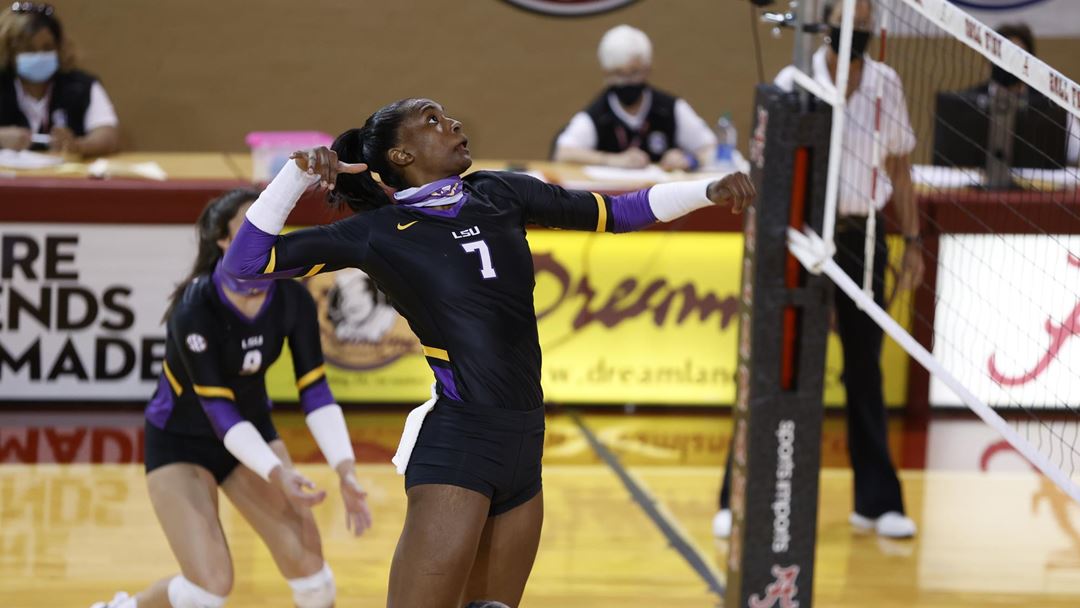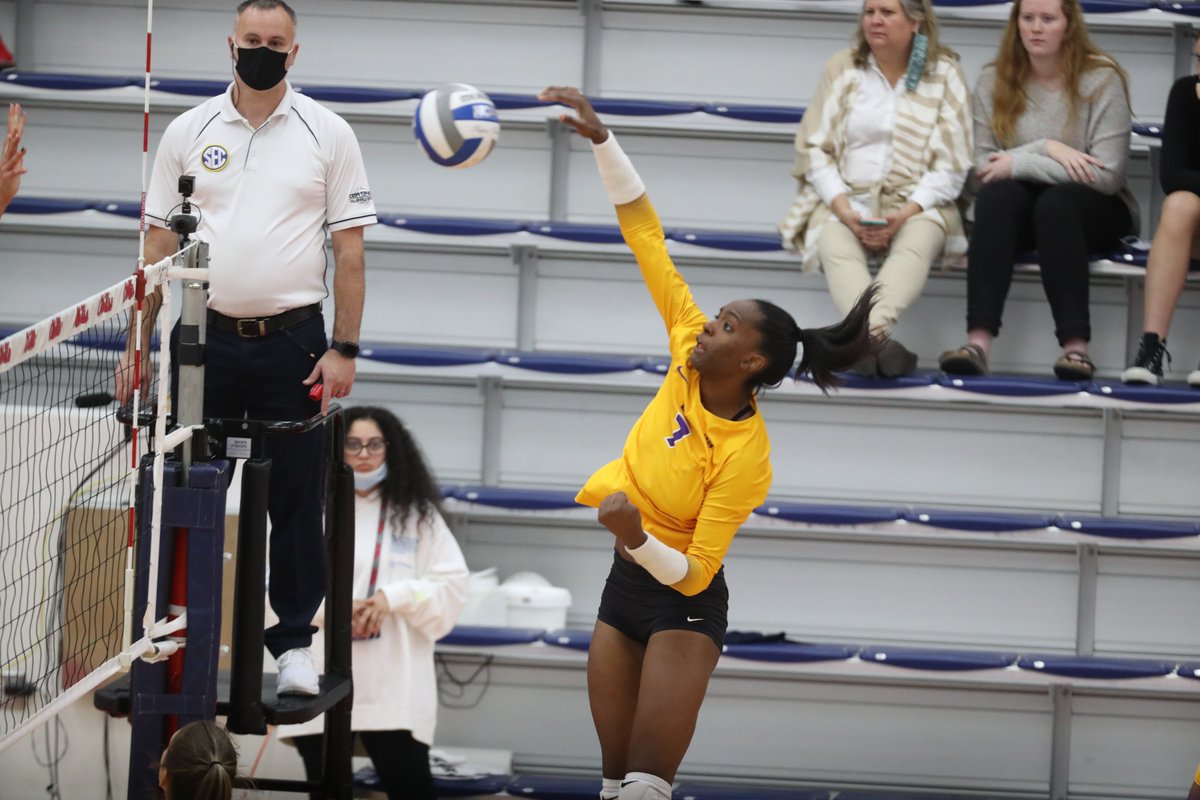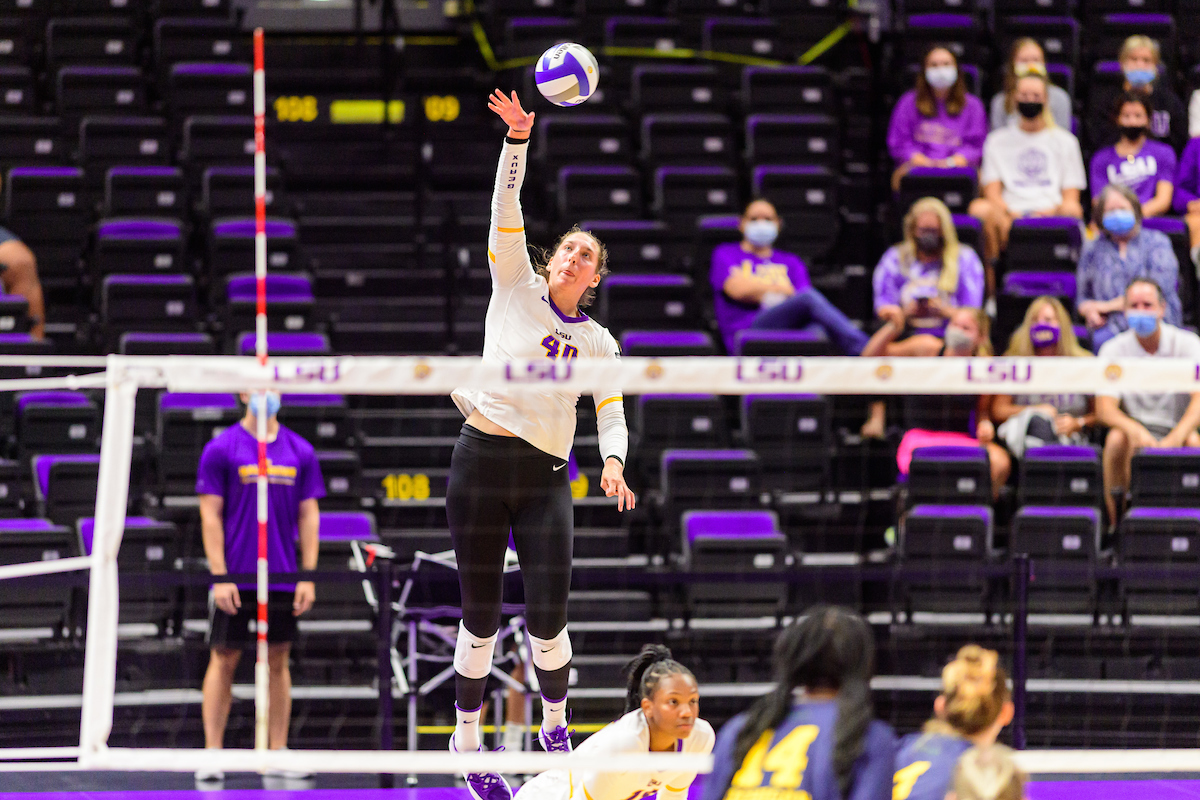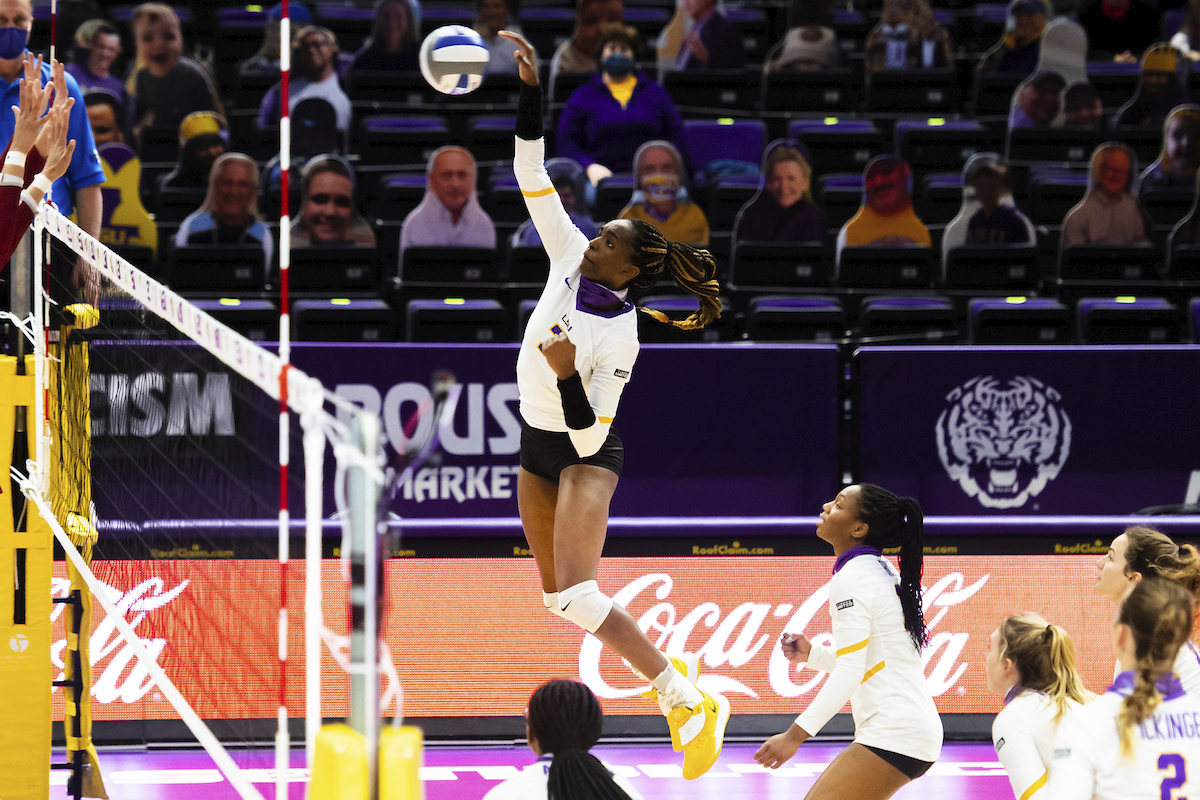
Being granted an additional year of eligibility for the 2021 volleyball season hit LSU All-American Taylor Bannister directly in the heart.
She had long considered her grandmother Opal Goff as one of the driving forces in her life and athletic career that’s carried her from Missouri City, Texas to LSU.
But because taking health precautions during the coronavirus pandemic has kept the 82-year-old Goff at home and not in attendance at any of Taylor’s games, there’s been a substantial void without her favorite cheerleader at courtside.
After three seasons at LSU, where she’s emerged among the best players in both the Southeastern Conference and the nation, Taylor contemplated opting out of the 2020 season. It beat the alternative of playing in what was supposed to be her final season without her grandmother present to watch the Tigers play a shortened SEC-only schedule of eight matches.
The NCAA not only extended a year of eligibility for all players, but the SEC devised a 16-game spring season that began with a Jan. 29-30 road trip to Missouri and continues Thursday and Friday vs. Arkansas in the Pete Maravich Assembly Center. Taylor hopes it will lead to a sense of normalcy later this fall when she returns for her fifth season to play a full complement of games with her grandmother present as much as possible.
“She’s one of the people that helped me get to where I am,” said Taylor, one of 14 players in LSU history to garner All-America status. “She told me she couldn’t make the games because of the things that were going on and with her age, she was liable to get the virus if she traveled and would watch from home. Hopefully, everything gets better, and she’ll actually be able to come and watch games in person like she used to.”
SPRING INTO ACTION
LSU embarked on a rare spring season that will follow the template from the truncated fall schedule, consisting of eight doubleheaders taking place over two days and will be evenly divided with four series at home, four on the road.
The spring will help serve as a catalyst for Taylor heading into the fall when the 6-foot-5 right-side hitter hopes to help the Tigers contend for a Southeastern Conference championship. She’ll also continue polishing her skills, graduate in December followed by the next step in her career on the professional circuit.
LSU volleyball coach Fran Flory said her top player’s future is a bright with pro avenues leading her to either Europe or Puerto Rico. The more she continues to train at such a high level and competes against some of the world’s finest competition is the time Taylor will truly shine, Flory said.
“As physical as she is, she’s still maturing,” Flory said. “She was a very late bloomer. Her best play is way in the future. . .like four or five years. If she’s fortunate enough to stay healthy enough, stay driven, stay focused on where she can go, I think Taylor’s best years will be at 28 to 30.”
Leonard Goff held out hope Taylor, his granddaughter and burgeoning athlete, would return to his backyard one day to resume playing on the basketball goal that had stood the test of time. It was also symbolic for a family raised on the game to continue fostering that same passion so prevalent to the next generation.
Goff was a well-respected player in Missouri City, Texas that went on to play at the University of Oklahoma. His wife Opal had also grown up playing the game in high school and together they gave passed their gift to their daughter Pennie.
She was a high school standout in both track and basketball, and then starred at Rice University in basketball where she finished as the school’s fifth all-time leading scorer with 1,564 points. She also played a year professionally with the Houston Shamrocks of the Women’s American Basketball Association.
The family’s expectation was that the love of the game would be handed down to her daughter Taylor, especially after Pennie married Ken Bannister, a former college and five-year NBA player. Together, they produced a slam dunk of athlete who initially embraced her basketball roots, while also following in her mom’s footsteps and excelling in track.
There was nothing to suggest Taylor would stray too far from the athletic path that been set for decades before her.
By the time she was 10, she was an All-American in the 800 meters. Given her genetics from her 6-9 father and her 6-1 mother, Taylor began to tower above the competition on the basketball floor until she approached her family with a dilemma.
“I had to stress to my dad that she didn’t like it,” Pennie said of her daughter’s discontent for basketball. “He had still had that goal laying in the backyard in case she changed her mind. But she loved volleyball. I tell people when God has his hand on something there’s not too much you can do.”
There are still emotional scars associated with Taylor’s decision when it came time to put down her basketball in favor of volleyball. Because of her family’s long-time association and success with the game, she didn’t realize the difficulty that would be involved in charting her own path.
When the subject of choosing between the two arose, a decision Taylor made nearly eight years ago, she needed time to compose herself.
“It kind of started off rough just because the whole family’s basketball,” she said, fighting back tears. “When I implied, I wanted to do volleyball, it wasn’t all positive feedback. It was kind of like, ‘Why do you want to do volleyball’? My mom came to my games and told me she supported me and to make sure I got a good scholarship.”
Taylor’s father and grandfather, died-in-the-wool basketball fans, needed some convincing.
“It was challenging for my dad and husband because we played basketball,” Pennie said. “Once they started seeing this was the sport she needed to be in, they were OK.”
Taylor’s heart simply was no longer in basketball, the result of a rail-thin kid getting introduced to the physical side of a game that had quickly lost its appeal. She discussed with her mother trying out for the high school volleyball team at Ft. Bend Christian Academy, an option she mentioned a month before the start of tryouts.
Save for one season of playing middle school volleyball in the sixth grade, Taylor was a relative neophyte in the sport and needed plenty of help in a short amount of time to prepare for her high school tryout.
Pennie struck gold in her task to find her daughter such last-minute assistance.
Coincidentally she discovered a nearby gym – Spike Shorts – with the name Debbie Sokol on the door, whom she asked for upon entering the building.
Pennie’s association with Sokol ran deep, having connected with her three decades before at Rice when Sokol was the women’s assistant basketball coach. Sokol was also the head volleyball coach at Rice before leaving to start running her own club-level volleyball programs.
“She knew I didn’t play volleyball,” Pennie said. “Taylor was about 5-10 at the time and Debbie asked if my daughter wanted to play volleyball and I said yes. Afterward she said Taylor had the softest hands she’d ever seen.”
Taylor made one of the school’s two junior varsity teams as a freshman and continued to work hard and to gain acceptance into a sport where club players form their own cliques and are more inclined to pass the ball to familiar teammates on the court.
After learning how to be a setter, the then-slender 6-1 Taylor wanted to spread her wings and take on the higher-tiered competition that club volleyball offered.
She began to flourish as part of the same club for three years before shifting to a new club her senior year.
One of the first eye-opening discussions Pennie recalled having with her daughter’s club coach before the 14-year-old squad played in a 16-year-old aged tournament centered around the prospect of college recruiting.
“She said you need to decide where you want to go, she’s going to get looked at,” Pennie said. “I’m like, ‘She’s 14, it really doesn’t matter.’”
A SECRET NO LONGER
Fran Flory’s cell phone rang continuously, finally catching her attention above the roar of the crowd in the San Antonio Alamodome where she was watching national club summer tournaments.
Then-LSU assistant Jill Lytle Wilson was in another downtown-area gym preparing to scout a game in which Taylor was playing, prompting Wilson’s call to her head coach Flory.
“She said, ‘Get here now, run’”,” Flory remembered of Wilson, now the associate head coach at Ohio State.
After about a 10-minute walk, Flory stepped into the gym and her jaw dropped at the sight of Taylor rising well above the net and unleashing kills with such force.
“I went, ‘Oh my’,” Flory said. “She was a long, gangly thing with arms and legs going every which way, but when her hand contacted the ball it was special.”
Taylor, who was going into her sophomore year, immediately vaulted to LSU’s No. 1 recruiting target. She was a player, though, with raw skills that flashed so much potential and made her a must-have for Flory and her staff.
Whenever Taylor’s club team played, LSU had a presence that day. It worked toward building relationships with the entire family, first with Pennie and her mother Opal and then Taylor’s father and grandfather, eventually securing her first unofficial visit to Baton Rouge.
“I looked around and thought it was a really nice campus and wanted to commit,” Taylor said. “It got better with Fran reaching out on my studies back home. She checked up on everybody, remembered every detail which helped me. She knew my grandmother’s name and asked about her.”
Having parents that played both college and professional sports, Taylor had plenty of resources to draw from during the recruiting process. They knew what to look for in a coaching staff when it came to maintaining a program with a winning culture and player development. There was also a school’s reputation academically and what that would mean for their daughter.
The only request Taylor had was that she didn’t want to go to a cold-weather climate.
Flory helped LSU put its best foot forward during an all-hands-on-deck approach during another unofficial visit with Taylor and her family prior to her junior year.
She put together a meeting in the conference room of then-LSU athletic director Joe Alleva that featured the entire volleyball coaching staff and the school’s academic support staff where they laid out their vision for Taylor as a student-athlete.
“We knew it was make or break,” Flory said. “We knew if we didn’t get it right, we weren’t getting this kid. There was a little more attention to detail. I was hopeful that what we had was what she and her family were looking for.”
Long-time LSU gymnastics coach D-D Breaux was also on hand to lend her unwavering support for Flory because of the understanding she had in being able to help secure a commitment from such an impactful recruit.
Breaux did her part, taking the hand of Opal Goff and providing reassurance LSU would take care of her granddaughter.
“My mother was sold after that,” Pennie said.
THE MAKING OF AN ALL-AMERICA CAREER
Taylor made her commitment official to LSU before the start of her junior season where her career at Ft. Bend Christian continued its upward trajectory. She was voted the district’s MVP her final two seasons as a middle blocker and was a three-time All-State selection with career totals of 350 kills, 220 digs and 100 blocks.
She was named a Fab50 Recruit by VollballMag.com and was a Under Armour second team All-American.
None of that mattered, though, when Taylor reached LSU. Her humble nature, engrained by her parents, was still intact and the flashy phenom from high school was trying to adapt to a new position as right-side hitter.
She recalled with great surprise Flory calling out her name as part of the team’s starting lineup in the first collegiate game which coincidentally was televised.
“At my high school only one side of the bleachers was pulled out,” she said. “Now, we were on TV and everyone’s watching. Once I calmed down, it helped me to relax.”
As she progressed, Taylor felt uncomfortable with the portrayal of her in a story that pegged her as the face of LSU’s program. She wanted to make sure everyone knew she was part of a team and incapable of achieving anything without their support.
“My name’s being said, I felt a lot of pressure coming on,” Taylor said. “All eyes were on me, but there was more than just me on the team. I can’t play six on one.”
Taylor’s raw power was on display and when she uncoiled her long frame, enemy blockers were defenseless to stop her.
She played in 30 matches as a freshman with 361 kills and earned the first of her three All-SEC first team honors along with AVCA All-South Region first team and the first of two honorable mention All-American laurels.
When not in season, she returned home in the summer to work with her trainer Leroy Franklin, her former track coach in high school, to continue rising in a sport she was covering plenty of ground in a short amount of time.
To do it, Taylor followed Franklin’s mantra: “Outwork everybody.”
One of Taylor’s biggest objectives as a sophomore was that if she was going to truly take her game to another level, she had to develop the type of versatility that would keep her on the court for all six rotations during the course of a match.
Aside from being able to hit from the front and back row, her improved court coverage enabled her to become better defender. Her length and timing permitted her to get to most balls other players couldn’t reach.
“You don’t see many 6-5 players across this country that can play defense the way Taylor does,” Flory said. “She’s agile and moves well. Those are attributes that we saw in her as a tiny stick figure.”
Taylor’s game grew as did her production with consecutive seasons of 400-plus kills with a career-high 456 in 2018 and career-bests in attacking percentage (.257), digs (147) and service aces (21) in ’19.
She’s eighth on the school’s career list with 1,423 kills but should challenge the top spot of 1,735 currently held by former All-American Nyla Shepherd, a player whose name Bannister favorably compares with among LSU’s greatest players.
“She will be amongst the best players to ever play here,” Flory said of Bannister. “You just don’t get athletes like Taylor very often.”




Be the first to comment